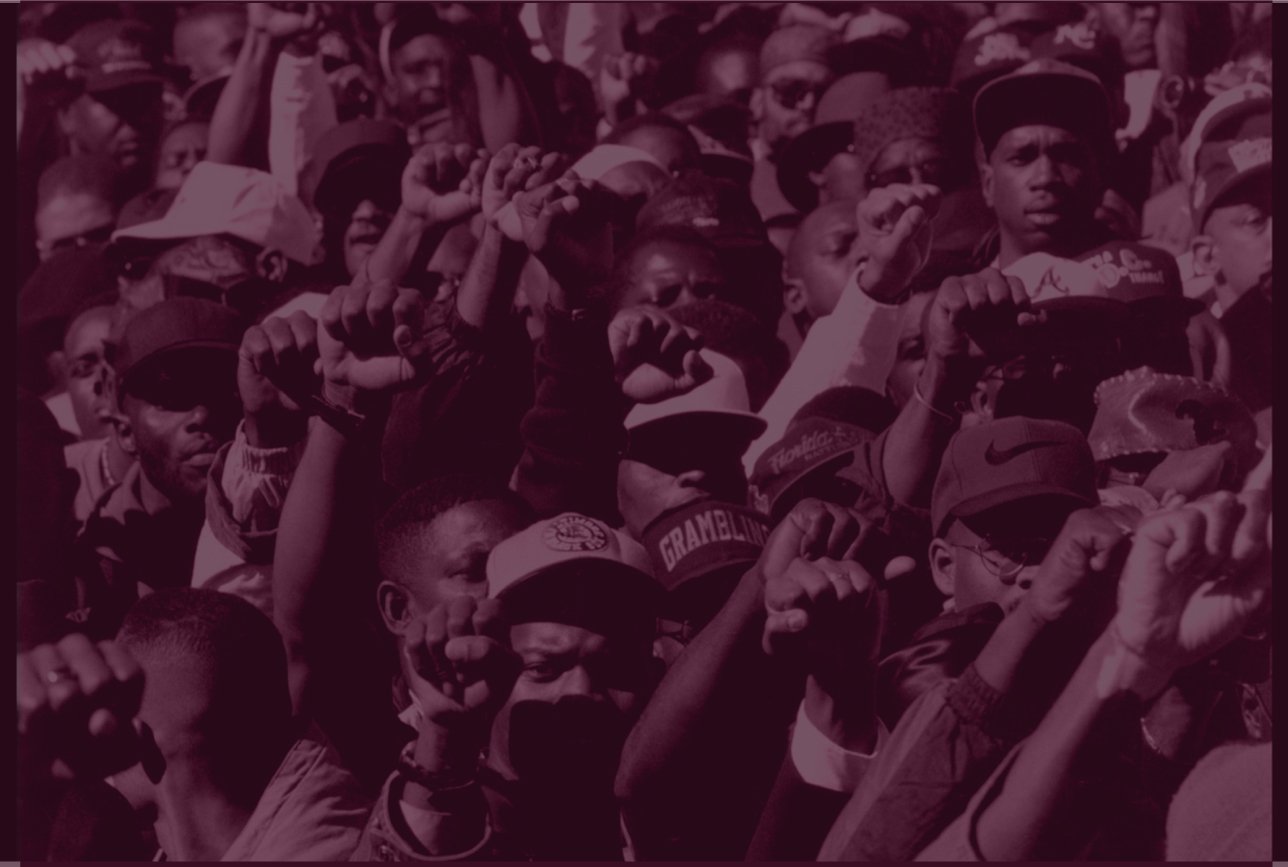
Unlocking Equitable Access to Covid-19 Healthcare Technologies

Since May 2021, a group of human rights networks and organizations have been convening to discuss how human rights legal mechanisms may be leveraged to achieve equitable global access to COVID-19 healthcare technologies and realize the right to health and other human rights of all people. These include: the Global Network of Movement Lawyers (at Movement Law Lab), ESCR-Net - International Network for Economic, Social and Cultural Rights, the International Network of Civil Liberties Organizations (INCLO), and organizations associated with the People's Vaccine Alliance, including Oxfam International and Médecins Sans Frontières. From the CERD petition below, to an urgent appeal and advocacy that led to 44 letters from UN Special Procedures to member states, pharmaceutical corporations and the WTO, to a legal brief signed by over 100 jurists on states' human rights obligation to not impede a TRIPS waiver and other actions, these organizations are working collectively to surface the human rights issues posed by states' decision to privilege the intellectual property monopolies rights of corporations over the human rights to life, and health, equality, and benefit from scientific progress of people across the global south and the global north.
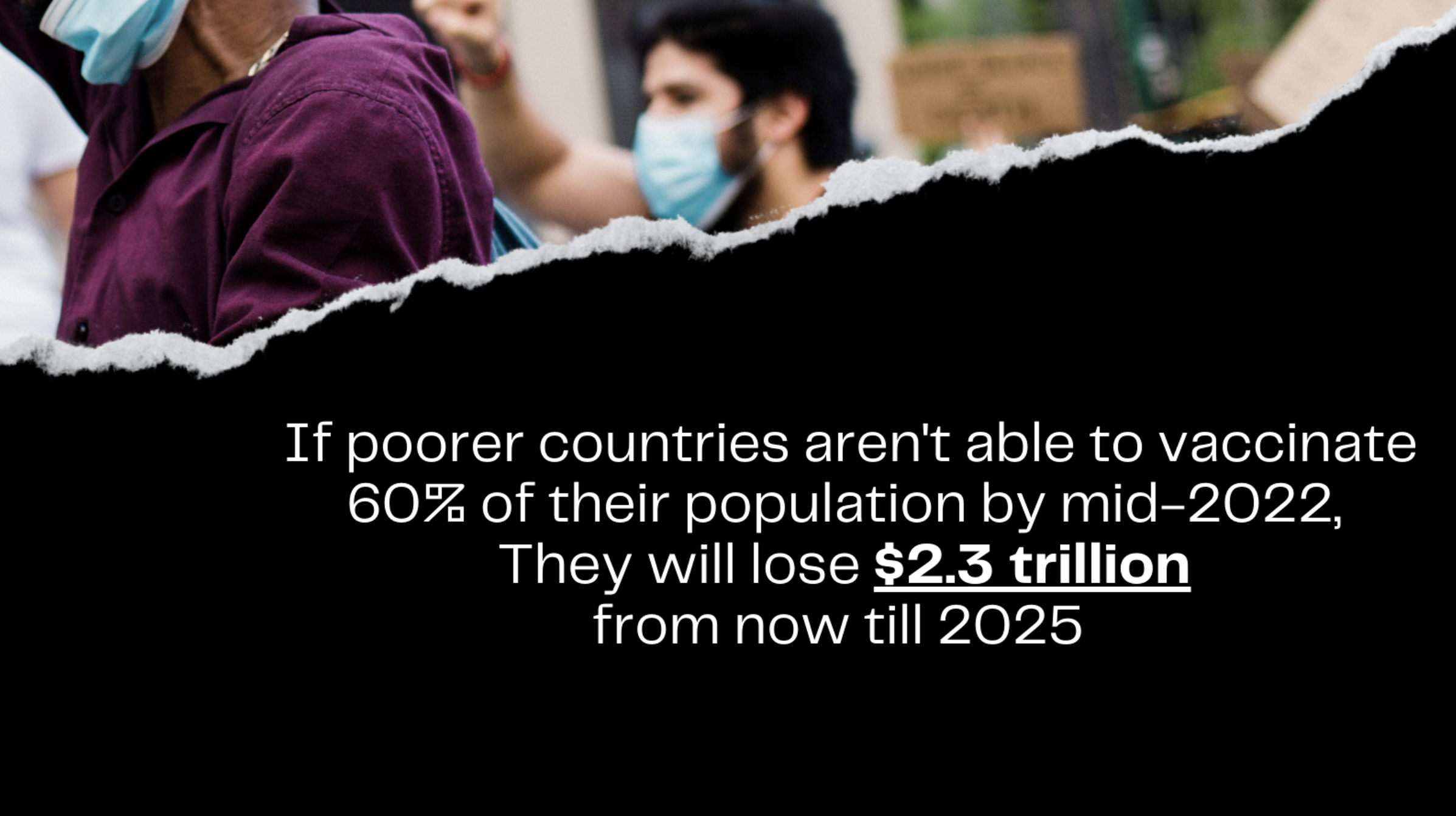
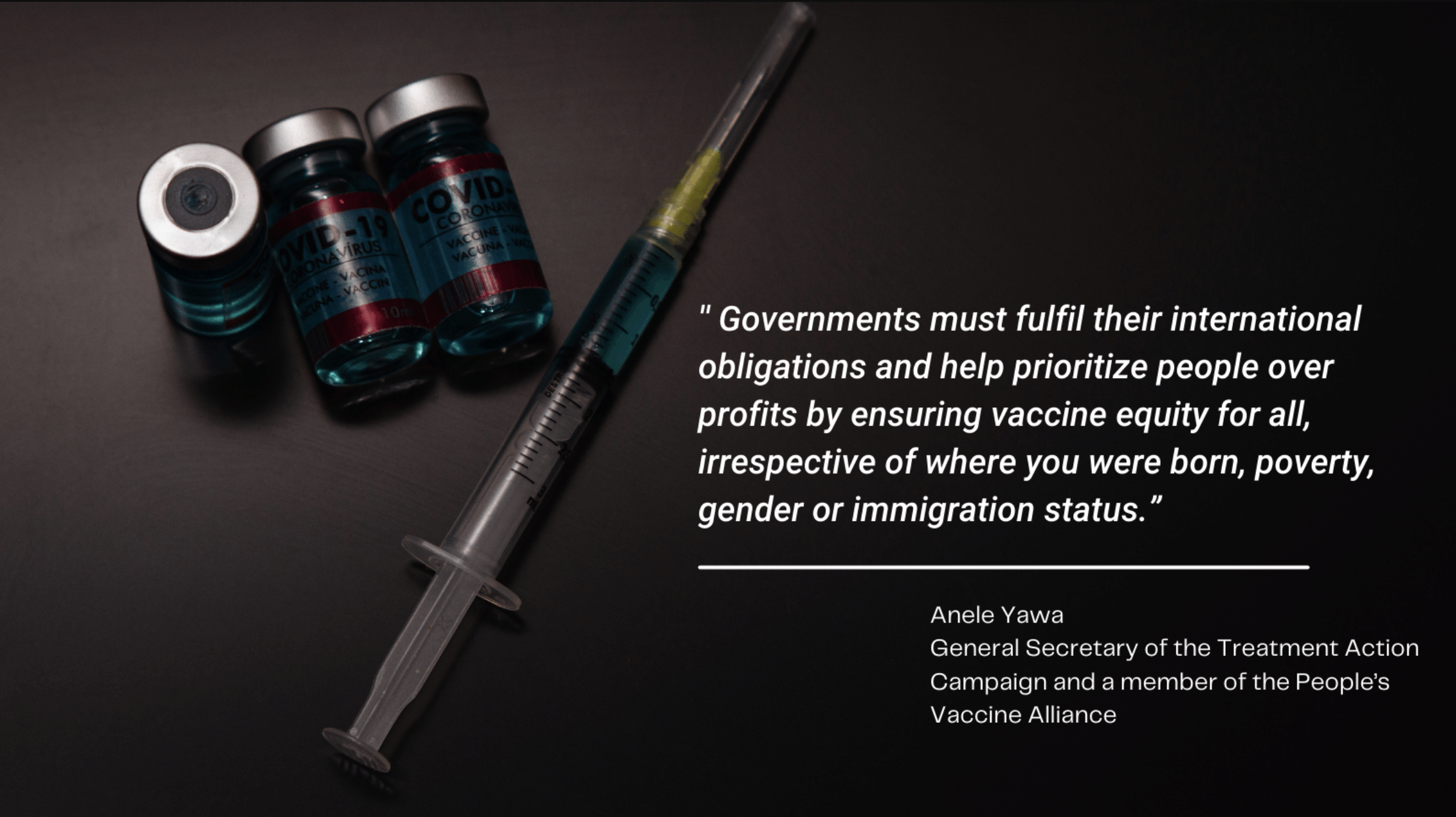
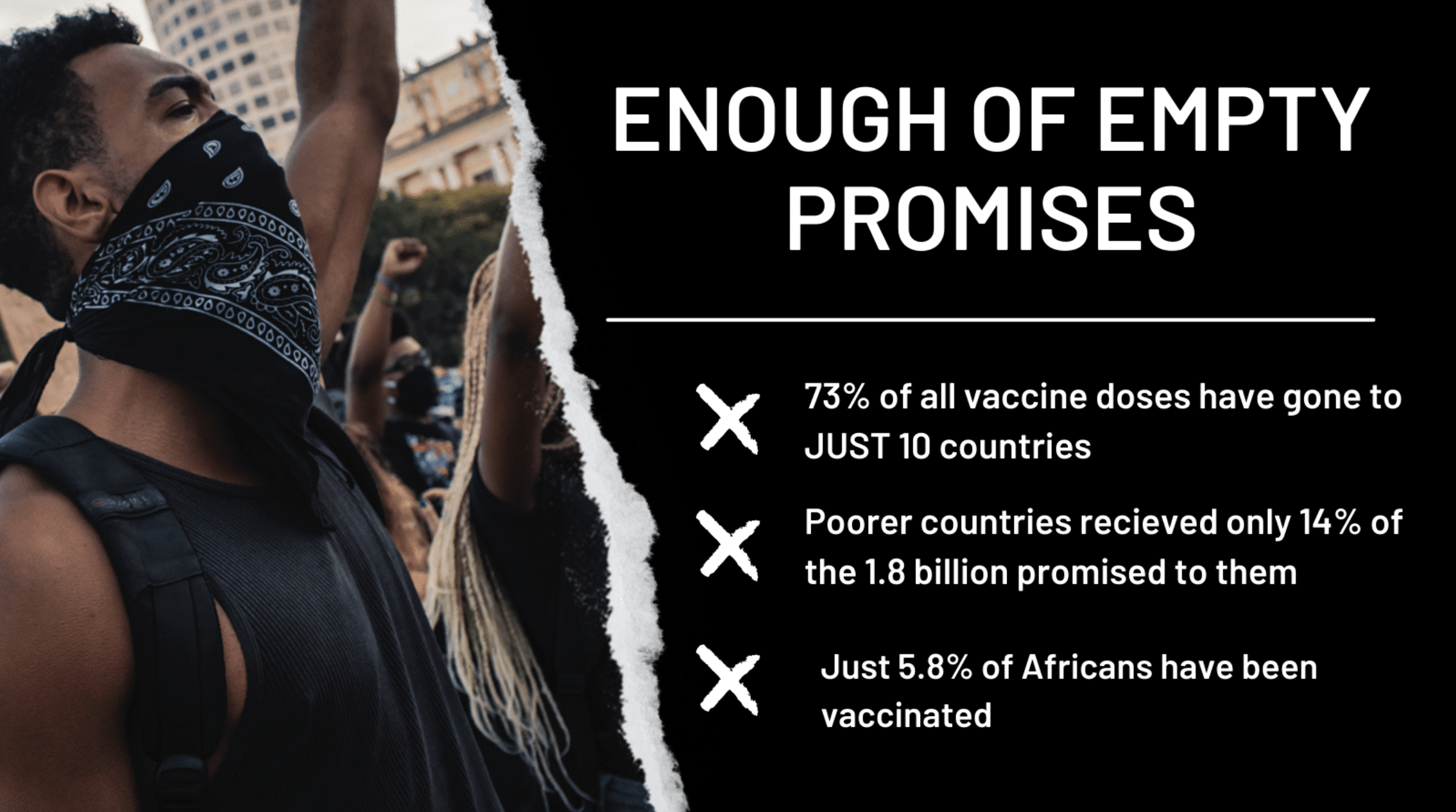
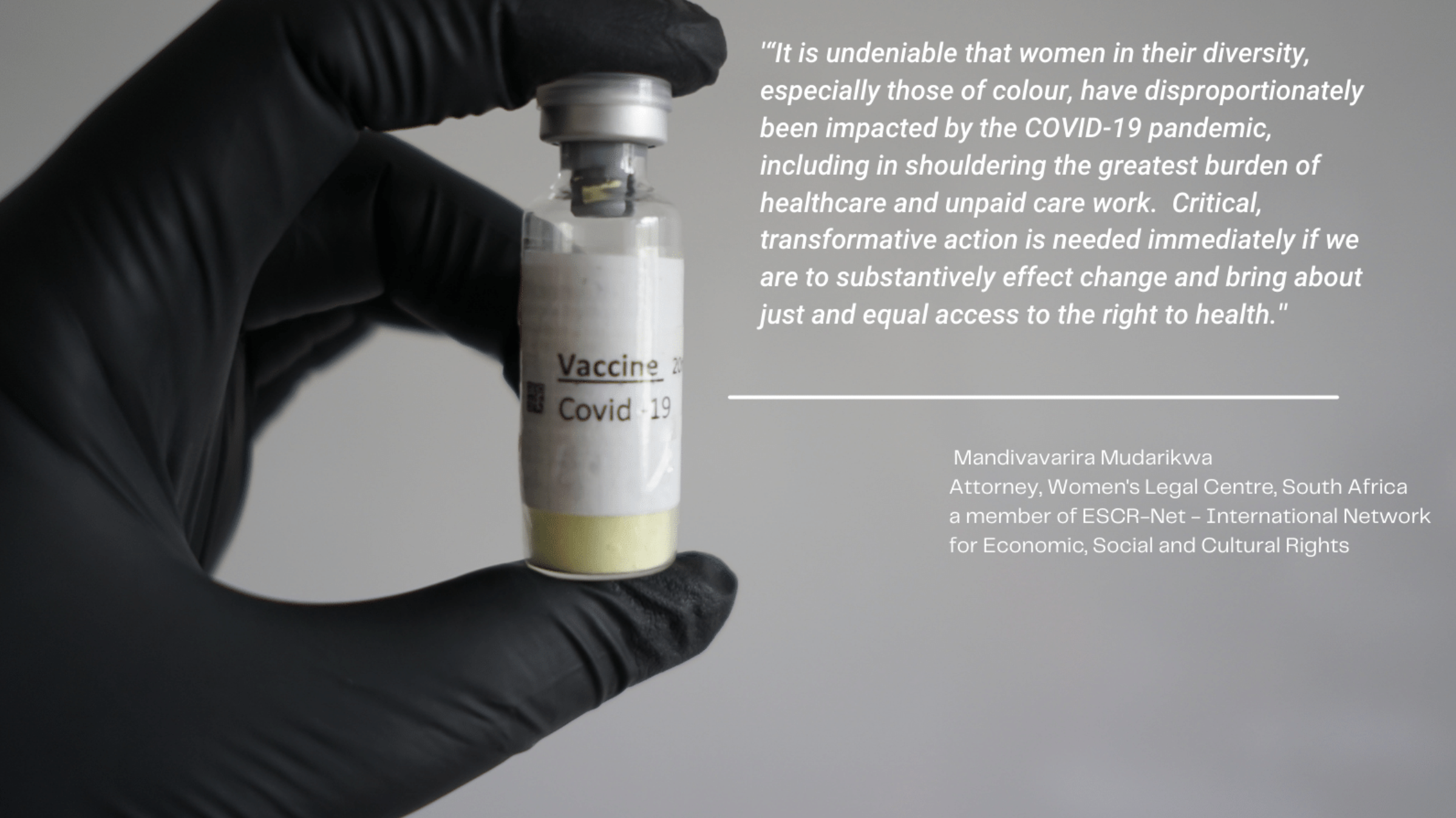
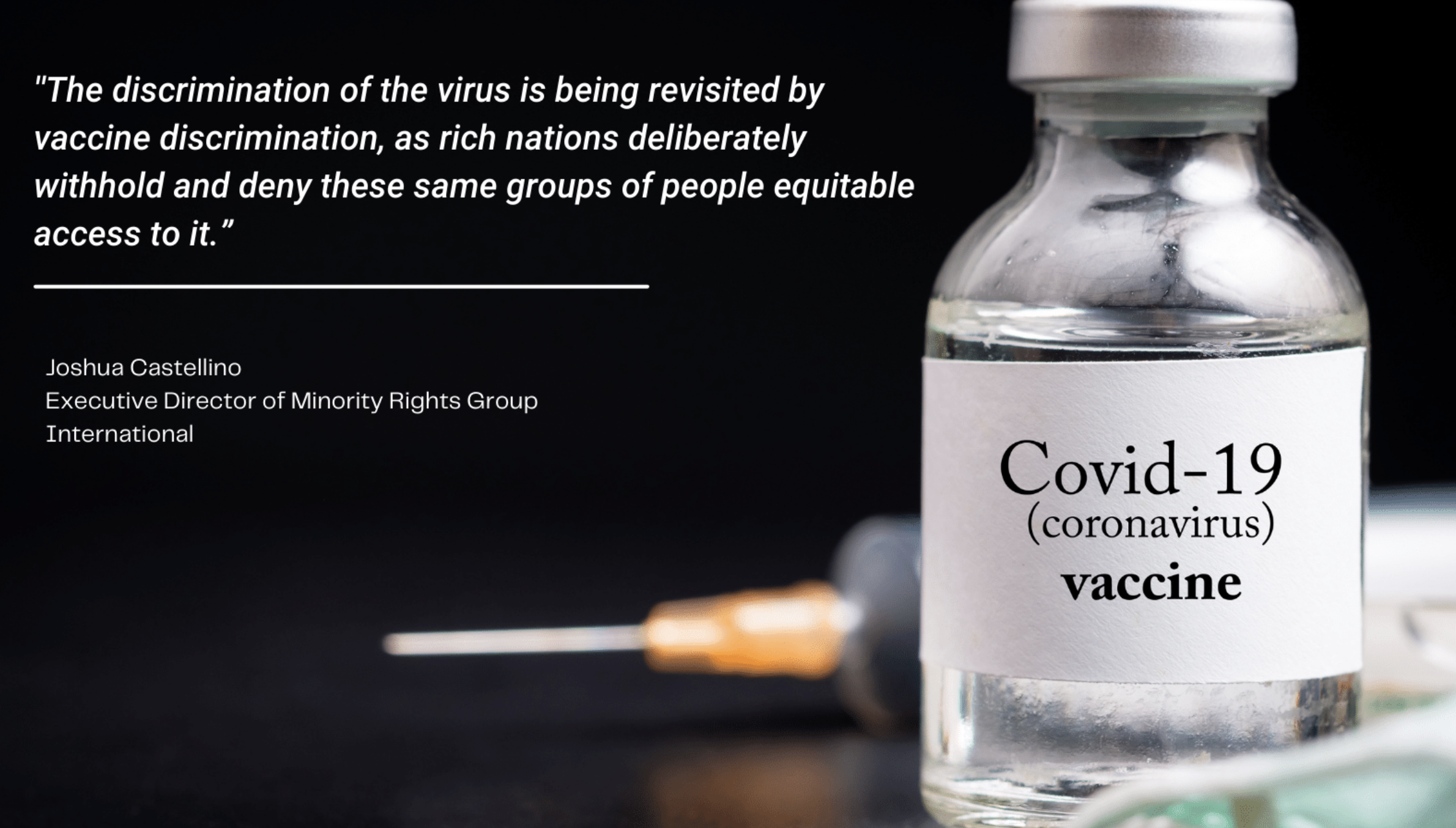
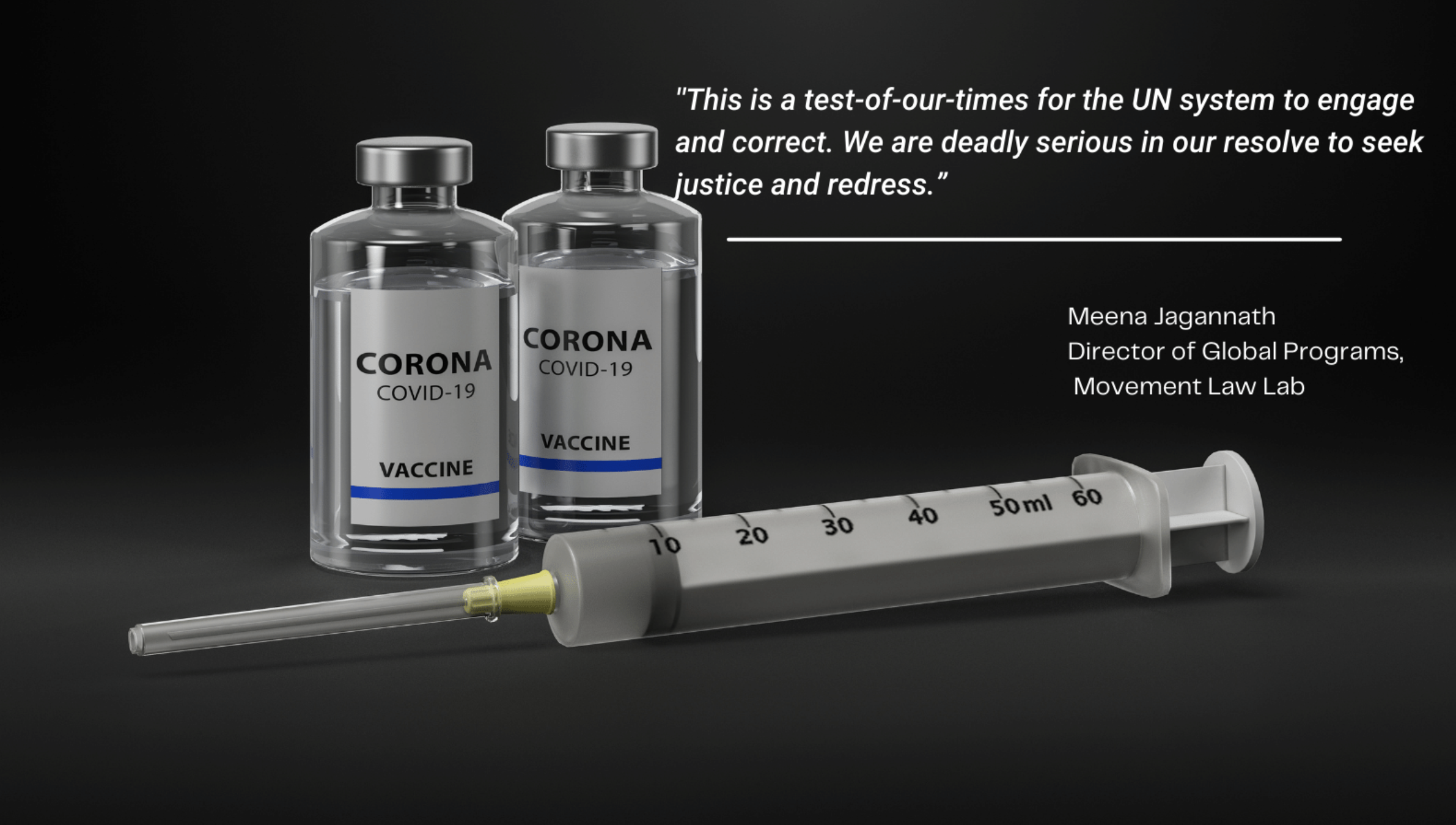
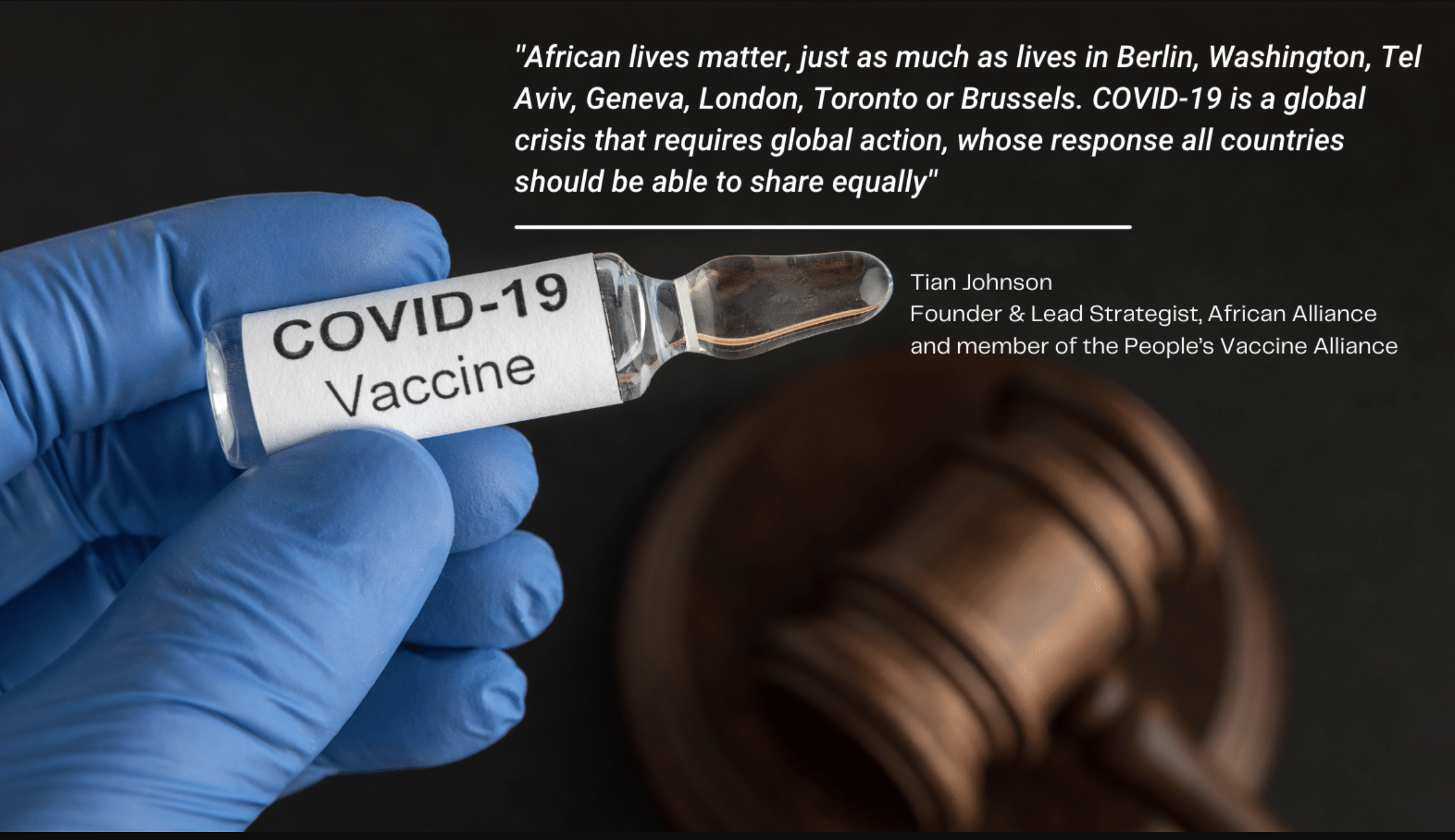
Global North States’ persistent refusal to waive COVID-19 vaccine intellectual property rights violated non-discrimination guarantee, UN Committee warns
GENEVA (31 August 2023) - The UN Committee on the Elimination of Racial Discrimination (CERD) today called on State parties in the global North, in particular Germany, Switzerland, the United Kingdom of Great Britain and Northern Ireland and the United States of America, to forgo intellectual property rights on COVID-19 pandemic protections, vaccines, treatments, or healthcare technologies to fully respect human rights.
In a decision adopted yesterday under its early warning and urgent action procedures, the Committee expressed its concern that COVID-19 remains a serious public health issue with devastating negative impacts that are falling disproportionately on individuals and groups vulnerable to racial discrimination, in particular people of African or Asian descent, ethnic minorities, Roma communities and Indigenous Peoples.
According to the latest WHO data, about 32 per cent of the global population has received at least one booster or additional dose of vaccine. However, in developing countries such as Gabon, Papua New Guinea, Burundi and Madagascar, the proportion is less than 1 per cent.
“The current challenges of inequality can be significantly mitigated by sharing access to intellectual property rights to life-preserving patents to vaccines, treatments and related technologies, which are currently reserved by a few countries in the global North,” the Committee said.
The Committee stressed that the persistent refusal to agree to a waiver of the Agreement on Trade-Related Aspects of Intellectual Property Rights (TRIPS Agreement) raises concerns regarding the obligations of State parties under the International Convention on the Elimination of All Forms of Racial Discrimination and the obligation to guarantee non-discrimination.
It urged State parties to prioritize human rights concerns and to incorporate strict human rights guarantees, including a mechanism that commits governments to suspend intellectual property rights in a health crisis, in the draft pandemic prevention, preparedness and response accord currently under negotiation at the World Health Organisation. It called upon “States parties in the global North to provide resources to enable poorer States to satisfy the core medical capacities that they are now expected to have in place under the International Health Regulations and to enable vaccines, relevant medicines and other necessary equipment and supplies to be available to all.”
CERD’s early warning and urgent action procedures, under the International Convention on the Elimination of All Forms of Racial Discrimination, primarily aim to consider situations that might escalate into conflicts in order to take appropriate preventive actions to avoid full-scale violations of human rights.
This decision is endorsed by the UN Special Rapporteur on contemporary forms of racism, racial discrimination, xenophobia and related intolerance, Ms Ashwini K.P.
UN Committee Decries Racial Discrimination in Global COVID-19 Vaccine Access
Publish Date: Friday, April 29, 2022
Germany, Switzerland, UK, and US Called to Account for Not Supporting a Comprehensive Waiver of Intellectual Property and Mandating Pharmaceuticals Transfer Technology
In a historic statement released this week, the United Nations Committee on the Elimination of Racial Discrimination (CERD or Committee) starkly warned that “only 15.21% of the population of low-income countries has received even one vaccine dose, creating a pattern of unequal distribution within and between countries that replicates slavery and colonial-era racial hierarchies.” As the Committee notes, under the International Convention for the Elimination of All Forms of Racial Discrimination, States are obligated to eliminate all forms of racial inequities, be they by purpose or effect.
The Committee’s statement comes in response to a complaint submitted by an international coalition of human rights law groups, public health experts, and civil society organizations, arguing that Germany, Switzerland, the United Kingdom (UK), and the United States (US) are in violation of international human rights law by failing to intervene on what has been an inequitable and racially discriminatory rollout of COVID vaccines and other healthcare technologies. The complaint urged the Committee to take action in advance of the upcoming World Trade Organization’s Ministerial Conference, where it is anticipated that States will consider the proposal to waive intellectual property barriers.
Acting on the petition submitted under their Early Warning and Urgent Action procedure, the Committee stressed “the insufficient supply of vaccines due to unequal global distribution necessitates urgent measures in relation to the intellectual property regime,” which restricts the supply of COVID-19 healthcare technologies through a web of patents, trade secrets, and other monopoly protections.
The Committee called specifically on Germany, Switzerland, the UK, and the US to support “the proposal of a comprehensive temporary waiver on the provisions of the [Trade-Related Intellectual Property Rights] (TRIPS) Agreement,” among other measures to mitigate the disparate impact of the pandemic. The Committee also held the named States to account for failing “to mandate COVID-19 healthcare technology transfers from nationally based pharmaceutical companies,” recalling their obligation “to ensure equal access to lifesaving healthcare services, including testing, vaccines and medical treatments.”
"Global vaccine equity demands collective action, cooperation and solidarity," said Labila Sumayah Musoke of the Initiative for Social and Economic Rights (ISER) based in Uganda.
“The ongoing vaccine imperialism just highlights the continued impact of structural racism, legacies of colonialism, and racialized capitalism on Black, Indigenous, and people of color in their diversity and other vulnerable and marginalized groups. Therefore we cannot talk of a new normal without dismantling these persistent systems of oppression and this is essential not only to end the pandemic but also ensure sustainable health equity.” - Statement of the Global South Vaccine Equity Coalition coordinated by Campaign against Racism of Equal Health
“Vaccine inequity is neither an unfortunate accident nor something inevitable. It is rooted in the failure of States globally to address the historical legacies of slavery, colonialism and apartheid which persist despite their formal abolition. The statement is a strong call for States to put the right to health and life of millions over private profit, and underscores the importance of global solidarity in fighting this pandemic, especially the enormous debt owed by countries in the Global North to those in the Global South,” said Ohene Ampofo-Anti, Program Associate at Center for Economic and Social Rights (CESR).
“At a time when calls for ending structural discrimination have finally taken root, the behavior of the States implicated in this, in failing to take adequate measures - with their own problematic histories, shows the shallowness of their commitment to these values,“ said Joshua Castellino, Executive Director, Minority Rights Group (MRG).
“The critical work to decolonise global health needs to move forward now more than ever. Countries in the Global South currently navigating a fifth wave of death, illness and destruction of livelihoods as a result of a profit-fueled pandemic is all the testament we need. If there was any doubt about whose lives matter to countries that claim to be ‘developed’, the injustice that is staring us in the face is a clear answer to that question,” said Tian Johnson, African Alliance.
“This decision is crucial to Latin America, a region that is mostly black and indigenous. Because of their transnational nature, Northern countries and transnational companies are rarely made accountable for the regimes they create to protect their own profit, with enormous impacts over the rights of marginalized populations in the Global South. While Latin America must debate the need to enhance its own production of pharmaceuticals, at the global level it is important to ask ourselves if applying intellectual property restrictions to healthcare technology is even compatible with recognizing the right to life of every human being,” said Camila Barretto Maia, Coordinator of the International Area at Centro de Estudios Legales y Sociales (CELS)
“Within our context, it is especially Black African women who work in the most precarious of working environments who face intersecting forms of discrimination and who carry the burden of the lack of access to adequate medical treatment and health care who are being overlooked and dismissed in favor of corporate and commercial interests. The statement finally recognizes that their voices have been calling out and that women will no longer be silenced.” - Statement of the Women’s Legal Centre - South Africa
The CERD statement is significant for its recognition of the historical root causes of the present COVID-19 vaccine and healthcare inequity both within and among States and how opposition to the TRIPS waiver sustains structural racial subordination. As the Committee noted, the “disproportionate impact of the pandemic on those groups protected by the Convention in terms of higher levels of morbidity and mortality is in significant part attributed to consequences of the historic racial injustices of slavery and colonialism that remain largely unaccounted for today and the contemporary racially discriminatory effects of structures of inequality and subordination resulting from failures to redress the effects of racism rooted in slavery, colonialism and apartheid.”
Moreover, the statement stands out for acknowledging structural racism as a global system that States have a duty to eradicate. In this regard, the Committee expressed deep concern that “the pattern of unequal distribution of lifesaving vaccines and COVID-19 technologies between and within countries manifests as a global system privileging those former colonial powers to the detriment of formerly colonized States and descendants of enslaved groups.” The statement can be read as an acknowledgment of the extra-territorial obligations which States owe to ensure the realization of economic and social rights for all, even those beyond their borders. This underscores the importance of global solidarity in addressing the ongoing effects of the pandemic, especially on the most marginalized groups.
Advocacy Before the UN Committee on the Elimination of Racial Discrimination
OP-ED: VACCINE INEQUITY DEEPENS STRUCTURAL DISCRIMINATION
Orig. Published in Open Global Rights, 11 Apr 2022
A volunteer wears personal protective equipment (PPE) at a Covid-19 drive-through vaccination facility at the Zwartkops Raceway in Pretoria, South Africa, in December 2021. The facility opened in an effort to increase vaccinations prior to the start of the annual end of year holidays, amid Omicron variant fears. EFE/EPA/Kim Ludbrook.
By: Ohene Ampofo-Anti, Camila Barretto Maia, Joshua Castellino, Pillkyu Hwang, Meena Jagannath, Tian Johnson, Mandivavarira Mudarikwa, Fernando Ribeiro Delgado, Labila Sumayah Musoke, Barbara Ransby, Joss Saunders, Sasha Stevenson, Anele Yawa
Over five decades ago, the first codified global human rights instrument on racial injustice, the International Convention for the Elimination of All Forms of Racial Discrimination (ICERD), was adopted by the United Nations General Assembly. As we celebrated the 56th anniversary of the ICERD a few months ago, it is disheartening that two years since the beginning of the COVID-19 pandemic, inequalities in vaccine and healthcare access continue to deepen along racial and intersectional lines.
In the 1960s, states in Latin America and the Caribbean, Asia and Africa were keen for this standard to be adopted. They had lived through slavery and colonization which destroyed their circular economies, witnessed deep-seated injustices such as those in Palestine and apartheid South Africa, and countenanced ill-treatment of their kin communities who lived as less than full citizens in the developed world.
The Convention’s goal was clear: unlike other human rights instruments, it expressly recognized how structural discrimination configured along different identity markers including race, denied access to rights to subjugated populations. Ratifying states agreed to ‘eliminate’ racially discriminatory structures and processes—both explicit and indirect—by advocating for the adoption of administrative, legislative, and judicial measures backed by a strong institutional infrastructure.
The extent to which this mandate has been successful is up for debate. A key question today is if this standard is able—and whether those who are its guardians are willing—to eliminate structural discrimination in the global response to the COVID-19 pandemic. (cont’d)
28 March 2022 Updated CERD Urgent Action Appeal
In light of the postponement of the WTO Ministerial Conference until June 2022, we updated our Urgent Action petition before the UN Committee on the Elimination of Racial Discrimination to incorporate new information about closed-door negotiations on the TRIPS waiver text and delineate the connections between the COVID-19 healthcare inequity at the global level we see today and legacies of colonialism that contribute to an ongoing global north and global south divide. Read the updated petition in full below.
Oct 2021 CERD Urgent Action Appeal
25 Nov 2021 Letter from Civil Society Organisations Endorsing the Urgent Action and Appeal
Carta en español: bit.ly/LETTERCOVID19ESCRNETSP
Lettre en français : https://bit.ly/LETTERCOVID19ESCRNETFR
الرابط بالعربية: https://bit.ly/LETTERCOVID19ESCRNETAR
TO: UN Committee of on the Elimination of All Forms of Racial Discrimination (CERD)
RE: LETTER OF SUPPORT TO THE URGENT ACTION APPEAL ON COVID-19 VACCINES AND OTHER HEALTHCARE TECHNOLOGIES
Independent Expert Members
Committee on the Elimination of Racial Discrimination United Nations
ohchr-cerd@un.org
Submitted: 25 November 2021
RE: Letter of Support to the Urgent Action Appeal on COVID-19 Vaccines and Other Healthcare Technologies
Dear Sir/Madam,
1. We refer to the Urgent Action Appeal submitted to the United Nations Committee on the Elimination of All Forms of Racial Discrimination (CERD) by the African Alliance, Center for Economic, Cultural Rights (CESR), Centro de Estudios Legales y Sociales (CELS), Minority Rights Group, OXFAM International and the Treatment Action Campaign (TAC) on 25 October 2021.
2. The petitioners of the Urgent Action Appeal request the CERD to address the immediate and long-term damage of entrenching racial discrimination caused by failures by certain states (Germany, Norway, Switzerland, the United Kingdom of Great Britain & Northern Ireland, and the United States of America) to take measures to ensure equitable global access to and distribution of life-saving COVID- 19 vaccines and other healthcare technologies.
3. We address this letter to jointly express our support for the Urgent Action Appeal.
3.1 Our support for the urgent appeal is motivated by the lived realities of many people and communities, primarily in the global South, whose lives continue to be devastated, with some losing their lives due to the COVID-19 pandemic-related compilations, its impacts and the inequitable global distribution of vaccines and other life-saving treatments and technologies.
3.2 We strongly agree that the development of COVID-19 tests, vaccines and related therapeutics has been key in the global health emergency responses to curb the spread of the virus and save lives by slowing down fatalities once a person has contracted the virus. Worryingly, COVID-19 tests, vaccines and related therapeutics are among the most unequally distributed health commodities, largely more accessible and available to higher income countries with predominantly white populations in the global North.
3.3 We have seen the devastating and intersecting ways in which the coronavirus pandemic has disproportionately inflicted on persons and communities already marginalised including but not limited to; people of colour, Indigenous Peoples, stateless persons, migrant workers, persons with disabilities and women in their diversity. Yet these persons and their communities, particularly those in the global south, have had astonishingly little access to the COVID-19 tests, vaccines and related therapeutics.
3.4 We have also watched in anguish how capitalism, power and self-preservation have continued to be more important than human rights, lives and international co-operation despite the continued threat posed by the COVID-19 pandemic. Specifically, the respondent states in the urgent action appeal have
opposed a request spearheaded by India and South Africa to temporarily waive intellectual property protections (including patents, copyrights, industrial design and undisclosed information) on healthcare technologies concerning COVID “prevention, containment or treatment” imposed by the Trade-Related Intellectual Property Rights Agreement (TRIPS), which has significantly contributed to the global racial, power, economic and geographical divides and discrimination.
3.5 We firmly believe that treaty bodies have an important role in preventing and responding to human rights violations. Given its mandate, the CERD is uniquely placed to address the current global racial inequality and other intersecting discrimination caused by the inequitable global access to and distribution of life-saving COVID-19 vaccines and other healthcare technologies. More importantly, we emphasise that CERD’s Urgent Appeal was adopted to respond to human rights problems requiring immediate attention to prevent or limit the scale of violations. As narrated in the urgent action appeal, it is clear, in our view, that the impacts and consequences of the respondent states opposition to the TRIPS waiver has had devastating consequences on many vulnerable and marginalised persons and communities warranting intervention as contemplated by the urgent action, explaining why we unequivocally support the filing.
4. The 12th WTO Ministerial Conference will take place from 30 November to 3 December 2021 in Geneva, Switzerland where further discussions on the TRIPS Waiver will take place. In our view a decision from CERD within this timeframe will be both opportune and impactful.
5. In amplifying our support for the urgent action appeal and its impact on the current inequitable access to, and distribution of life-saving COVID-19 vaccines and other healthcare technologies, we request the CERD to adopt a decision on the appeal including express specific concerns and provide recommendations for action during its 105th session to be held from 15 November 2021 to 3 December 2021.
We thank you for your attention and consideration.
ORGANIZATIONS
Women's Legal Center (WLC), South Africa
Initiative for Social and Economic Rights (ISER), Uganda
A11 - Initiative for and Social Rights, Serbia
AfroResistance, Americas
Amnesty International (AI), United Kingdom
Asian Dignity Initiative, Republic of Korea
Asociación Interamericana para la Defensa del Ambiente (AIDA), Colombia Association of Physicians for Humanism, Republic of Korea
Bangladesh Legal Aid and Services Trust (BLAST), Bangladesh
Cátedra UNESCO de Desarrollo Humano Sostenible (Universidad de Girona), Spain
Center for Constitutional Rights (CCR), United States
Centre for Human Rights and Development (CHRD), Mongolia
Centre for Legal Aid, Uganda
Centro de Estudios de Derecho, Justicia y Sociedad (DEJUSTICIA), Colombia
Centro de Estudios para la Equidad y Gobernanza en los Sistemas de Salud (CEGSS), Guatemala
Coalition Sexual and health rights of marginalized communities MARGINS, North Macedonia
Colectivo de Abogados José Alvear Restrepo (CAJAR), Colombia
Comité Ambiental en Defensa de la Vida, Colombia
Equal Health Campaign, Spain
FIAN International, Germany
Habitat International Coalition - Latin America Office, Mexico
Human Rights Law Network (HRLN), India
International Centre for Ethnic Studies, Sri Lanka
Just Fair, United Kingdom
Korea Women's Associations United (KWAU), Republic of Korea
Korean Pharmacists for Democratic Society, Republic of Korea
Lawyers for Human Rights, South Africa
Legal Resources Centre (LRC), South Africa
MINBYUN Lawyers for a Democratic Society, Republic of Korea
Movement for Black Lives
Nagorik Uddyog, Bangladesh
Namati Mozambique
Namati Sierra Leone
Observatori DESC, Spain
Open Net Association, Republic of Korea
Our Journey, Malaysia
People's Health Movement Canada / Mouvement populaire pour la santé au Canada
People's Solidarity for Participatory Democracy, Republic of Korea
Proyecto de Derechos Económicos, Sociales y Culturales (ProDESC), Mexico
Sexual Minorities Uganda
INDIVIDUALS
Labila Sumayah Musoke, Uganda
Pillkyu Hwang, Republic of Korea
Amanda Gatewood, MPH, PhD, United States
Anam Hasan, United States
Andrea Westby, United States
Angela Maria Alvarez Hernandez, Colombia
Anisha Rimal, United States
Anne Marie Collins, Spain
Berenice Bautista Suarez, United States
Camara Phyllis Jones, MD, MPH, PhD, Past President of the American Public Health Association, United States
Camilo Renteria Cooper, Colombia
Dina Sakr Khaled, United States
Eimi Vanesa
Ramos Hurtado, Colombia
Ernesto Pedroso Varela, Colombia
Eva Xiomara Tapia Perez, Colombia
Fabian Augusto Pantoja Medina, Colombia
Geraldynne Sierra Rueda, Colombia
Febi Yonesta, Indonesia
Halla Shoaibi, Palestine
Ingrith Katerin Sanchez Aroca, Colombia
Jackie Dugard, South Africa
Jodi F. Abbott, United States
Joy Biungi, Uganda
Judith Bueno de Mesquita, United Kingdom
July Andrea Murillo Carreño, Colombia
Dr Kumi Naidoo, Germany
Laura Gomez, United States
Lilian Chenwi, South Africa
Linda Eleanor Sharp, MD, United States
Logan David, Colombia
Mahima Poreddy
Maria Fernanda
Angarita Diaz
Mario Gomez, Sri Lanka
Maya Sheri Malik
Michael Westerhaus, MD, MA, United States
Michelle Morse
Nasreen Quadri
Nathaly Paula
Tatiana Aguilar Sandoval
Rebecca Landy
René Fernández, Colombia
Richard Brach
Dr. Ruth Staus, United States
Sandra Milena Renteria Renteria, Colombia
Sarita Ranchod
Tanvi Avasthi, United States
Toni Eyssallenne
Advocacy in the news
Oct 19 2021 - OHCHR, 'UN Experts send pharma companies, States, EU and WTO letters calling for urgent action on COVID-19 vaccines'. (All letters)
Nov 8 2021 - “Global jurists call for waiver of global intellectual property rights for COVID-19 vaccines and therapeutics”
Nov 9 2021 - Common Dreams, ‘Global Jurists Say International Law 'Requires' Rich Nations to Stop Blocking Patent Waiver’
Nov 10 2021 - Common Dreams, ‘Campaigners Petition UN to Investigate Racial and Gender Discriminations in Global COVID-19 Vaccine Roll-Out’.
Nov 25 2021 - ‘Rights lawyers eye action against nations blocking Covid jab IP waiver’
Nov 29 2021 - Open Global Rights, Supporting the TRIPS COVID-19 waiver is an essential step to support international human rights'.
Nov 30 2021 - Op Ed: Aljazeera, Rich countries must stop blocking the COVID vaccine patent waiver;
Dec 1 2021 - Op Ed: El Pais, Los derechos humanos y los Estados ante la exención de patentes covid
Apr 11 2022 - Op Ed: Open Global Rights, ‘Vaccine inequity deepens structural racial discrimination’
Apr 29 2022 - UN CERD Press Communique, https://www.ohchr.org/en/press-releases/2022/04/un-committee-elimination-racial-discrimination-issues-findings-cameroon



